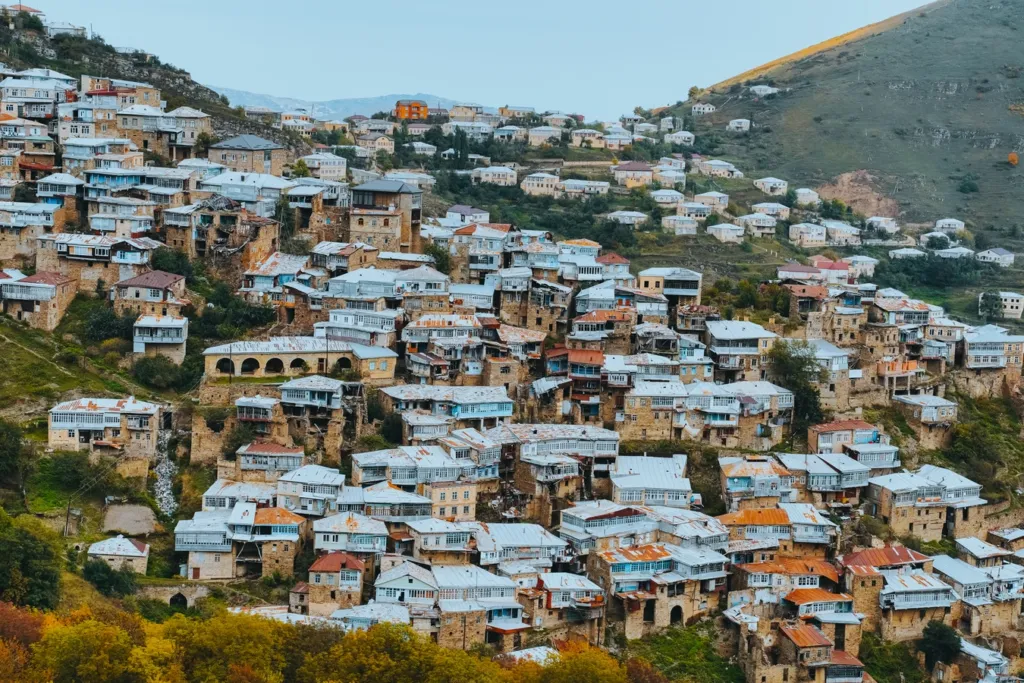Kubachi is an urban-type settlement in the Dakhadayevsky District of the Republic of Dagestan, Russia. It sits at 1 700 m above sea level in a narrow mountain valley. The settlement and its immediate surroundings cover a small area. The population was about 3000 people as of 2010. The local language is the Kubachi dialect of Dargin; official languages are Russian and other Dagestani tongues. The currency is the Russian ruble. Drugs are banned at the federal level, and alcohol is sold only in district centers in limited quantities; public drinking within Kubachi is not customary.
History
Kubachi is first mentioned in Russian and Persian chronicles of the 4th–5th centuries under the name Zerihgaran, meaning “place of chain mail makers.” It served as the capital of the medieval state of Zirikhgeran until the 15th century, when it was absorbed into the Kaitag Utsmiate. In 1965, Kubachi was granted urban-type settlement status.
Industry
The chief local industry is artistic metalwork. Kubachi craftsmen have produced silver and steel items—jewelry, daggers, tableware, and weaponry—for centuries. In the 19th century, several forges and silver workshops operated here; production declined after the Soviet collapse but has experienced a revival since the mid-2010s.
Religion and traditions
About 98 percent of residents practice Sunni Islam. Small minorities include Christians and non-believers. Social life revolves around Sharia principles, family and clan rites, reverence for elders, elaborate hospitality, and collective celebrations known as walad.
Clothing
Locals dress in modern styles—jeans, trousers, shirts, and mid-length dresses. Tourists should avoid shorts, very short skirts, open-toed shoes, and bare shoulders in public and especially in mosques. Women must cover their heads in religious buildings. In the mountains, practical attire is essential: trekking pants, layered tops, a windbreaker, and sturdy boots.
Living standards and corruption
Living standards are below the Russian average. The typical monthly wage is around 25 000 ₽, and the official unemployment rate is 20–25 percent. The region ranks low on the national Human Development Index. Corruption is common—small bribes for official paperwork and at traffic stops occur frequently.
Wars and conflicts
During the 20th century, the region was affected by the Chechen wars and North Caucasus security operations. Since the mid-2000s, extremist activity has declined, but isolated terror incidents and special-services raids still take place.
Holidays
Key celebrations include the Muslim festivals of Eid al-Fitr (Uraza-Bayram) and Eid al-Adha (Kurban-Bayram), as well as New Year’s Day and Victory Day. Local villages host clan festivals featuring traditional dances and songs.
Traditions
Hospitality is central: communal feasts, rounds of strong tea, and the custom of removing shoes upon entering a home. Tourists should notify hosts before visiting family residences, ask permission before photographing people or private property, and show respect toward elders and religious practices.
Tourism
Kubachi is renowned as a living center of metalworking and jewelry craft. Standard itineraries include visits to artisan workshops, the medieval Aqila-Kala tower, the local lore museum, and historic clan mansions. The surrounding peaks offer trekking routes and photo excursions.
Types of tourism
— Cultural-historical: hands-on jewelry-making workshops
— Ethnographic: insights into Dargin daily life
— Eco-tourism: guided mountain hikes
— Culinary: tasting authentic local dishes
— Photo tourism: capturing village landscapes
— Mountaineering: ascents of nearby summits
Tourist attractions
– Aqila-Kala tower: 20 m high medieval fortress atop a hill
– Local lore museum: exhibits on Kubachi’s history and culture
– Silver workshops: live demonstrations and sales of handcrafted pieces
– 19th-century mosque: prime example of mountain architecture
– Panoramic overlooks: sweeping valley views
Non-touristy attractions
– Abandoned Soviet-era craft workshops
– Private house museums of famed smithing families
– Hidden trails to mountain springs and sacred stones
– Rural clinics offering traditional herbal remedies
– Family-run vineyards cultivating arçuk and local grapes
Local cuisine
Staple dishes include lopa-pilaf (rice with lamb and lentils), hinkal-galnash (meat-filled dumplings), belya (flatbreads with cheese and herbs), and chapalash (chickpea sauce). Beverages include strong tea, kumiss, and barley brew. Breakfast is served at 9–10 AM, lunch at 2–3 PM, and dinner at 7–8 PM. Guests are offered the choicest portions and encouraged to accept seconds.
Why visit
Kubachi remains one of Russia’s few living hubs of folk artistry. Visitors can attend master classes, watch jewelry pieces take shape, and purchase unique handmade treasures. The rugged mountain scenery and authentic way of life provide deep immersion into North Caucasus culture.
Safety and wildlife
Crime in the village is low; petty theft is the main concern. Terrorist risk is minimal, but hikers should follow official routes and register with authorities. Wildlife—including mountain goats, wolves, and bears—roams the surrounding hills; encounters are rare, but food should be stored in sealed containers.
Service level
Kubachi lacks large hotels; accommodations consist of guest houses and ethno-estates with cozy rooms. There are no standalone restaurants; meals are provided by local households or guest courtyards.
Entry rules
Kubachi is part of Russia, so visitors require a valid Russian visa. Checkpoints enforce passport and migration-card inspections. Prohibited imports include weapons, narcotics, and extremist materials. Alcohol and tobacco allowances follow general Russian customs regulations.
Transport
Kubachi is reachable by scheduled buses from Makhachkala, Derbent, and Khasavyurt. Tickets are purchased at bus station counters. Within the settlement, travel is on foot or via local taxi drivers.
Automobile
Car rentals are available in Makhachkala. Local drivers often flout traffic rules, and on-the-spot settlements with police are common. There are no toll roads. The legal blood-alcohol limit is 0.3 ‰. Speed limits are 60 km/h in towns and 90 km/h outside. Speed cameras are rare, but police checkpoints are frequent. A dashboard camera is recommended. Roads are mountainous and rocky—an SUV is advisable. Fines range from 500 ₽ to license suspension.
Noise regulations
Quiet hours run from 22:00 to 7:00. On weekends and public holidays, noise is prohibited at all hours.
Daily tourist budget
Budget: 2 500–3 500 ₽ (~30–40 USD) for guest-house lodging, home-cooked meals, and buses. Comfort: 5 000–7 000 ₽ (~60–85 USD) for private stays, guided tours, and transfers. Premium: from 10 000 ₽ (~120 USD) for a private guide and SUV rental.
What is not recommended or strictly forbidden
Do not photograph private homes without permission, pick plants in protected areas, swim in wild mountain rivers without a life jacket, litter, insult religious sentiments, or explore abandoned military sites.
Climate
Kubachi has a moderately continental mountain climate. Summers are warm (15–25 °C); winters are cool (–5 to +5 °C). Spring brings the rainy season; snow falls from November through March. The best times to visit are May–June and September–October for trekking, and July–August for cultural and craft experiences.
- The Louvre welcomes Renaissance masterpieces from Naples Capodimonte Museum
- Africa
- Mongolia
- Dance of Spirits in the Arctic Sky: The Northern Lights in Lofoten Island Mythology
- Greenland
- Where tourists are kidnapped for ransom
- Arabat Spit
- Film about Kamchatka – Volcanoes, Wildlife and Untouched Nature
- How to Get Around Australia
- Alaska
- Bosphorus
- From a Scientific Point of View: The Grand Canyon
- Rising prices for travel in Germany in 2025: reasons, scale and consequences
- Holiday in Monaco
- Treasure in the Cape Cod fog: A Thai traveler’s encounter with pirate history
- Ecuador
- Moab
- Sri-Lanka
- Kamchatka
- Liberation of Belarus from the Nazis











